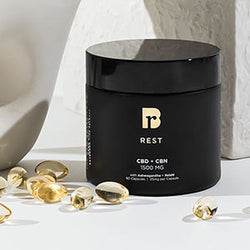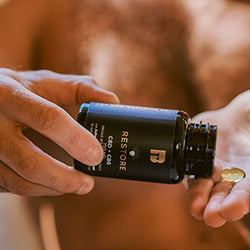Have you ever felt like you need a translator just to understand the alphabet soup of cannabinoids? Let’s see, there’s THC, CBD, CBC, CBN, CBG, and so many others. Today, we’re going to focus on just two.
While CBD (cannabidiol) has become a household name in recent years, its cousin CBC (cannabichromene) doesn’t always get the attention it deserves. So, what is CBC exactly, and how is it different from CBD? Here’s what you should know about the differences and similarities between these two remarkable cannabinoids.
What are CBC and CBD?
Both CBC and CBD are natural compounds found in hemp plants. They're part of the 100+ cannabinoids scientists have identified, with each offering unique benefits. Unlike THC, neither CBC nor CBD will get you high, making them the best options if you’re looking for health benefits without the psychoactive effects.
CBD (cannabidiol) has gained mainstream popularity in recent years for its potential to help with anxiety, sleep issues, and general wellness. It's widely available in various forms, from oils to gummies to skincare products.
CBC (cannabichromene), on the other hand, is one of the most promising rare cannabinoids that's only recently gaining attention. CBC has lived in CBD's shadow despite showing remarkable potential for inflammation, pain management, and brain health.
How CBC Works Differently from CBD
The difference between CBC and CBD goes beyond their names. These two distinct cannabinoids interact with your body in fundamentally different ways.
Receptor Interactions
CBD primarily works by influencing CB1 and CB2 receptors in your body’s endocannabinoid system – though it doesn't bind directly to them. It also interacts with several other receptors, which explains its wide range of effects.
CBC, however, does bind to and activate your CB2 receptors. It also activates your TRPV1 receptors – also known as vanilloid receptors. These are the same receptors that respond to capsaicin (the compound that makes chili peppers hot) and play a crucial role in pain perception, inflammation, and body temperature regulation.
This unique interaction with TRPV1 receptors & CBC is what makes CBC particularly effective for certain types of pain and inflammation.
Anandamide Effects
Another key difference: CBC inhibits the reuptake of anandamide, a naturally occurring endocannabinoid often called the "bliss molecule." By allowing anandamide to remain in your bloodstream longer, CBC may help prolong feelings of well-being and potentially boost mood.
While CBD also affects anandamide levels, CBC's effects appear more pronounced in this regard.
CBC vs CBD for Pain & Inflammation
When it comes to managing pain and inflammation, the CBC oil vs CBD oil comparison gets particularly interesting.
Anti-inflammatory Properties
Research suggests that CBC for inflammation may be even more effective than CBD in some cases. Studies show CBC can reduce the production of inflammatory compounds while increasing endocannabinoid levels – creating a powerful anti-inflammatory effect.
What makes this exciting is that CBC for pain relief works through different pathways than traditional pain medications, potentially offering an alternative for those who don't respond well to conventional treatments.
Neuroprotective Benefits
Both cannabinoids show promise for brain health but in different ways. CBC appears to increase the viability of developing brain cells (neurogenesis), particularly neural stem progenitor cells (NSPCs). These cells are crucial for nerve cell healing and protection against oxidative stress.
CBD, meanwhile, has been more extensively studied for anxiety, seizure disorders, and general neuroprotection. Each offers distinct benefits for brain health through different mechanisms.
Entourage Effect: Better Together?
While comparing CBC and CBD is useful, it's worth noting that these cannabinoids may actually work best together – a phenomenon known as the "entourage effect."
Studies suggest that combining CBC and CBD creates synergistic benefits, particularly for pain and inflammation. The compounds enhance each other's effects, potentially providing more comprehensive relief than either cannabinoid alone.
This is why many high-quality formulations will contain both CBD and CBC, rather than isolating just one compound.
|
Aspect |
CBC |
CBD |
|
Primary receptors |
TRPV1 |
Indirect effects on CB1 & CB2 |
|
Availability |
Rare, more expensive |
Widely available |
|
Pain relief mechanism |
Strong TRPV1 activation |
Multiple pathways |
|
Research depth |
Limited but promising |
Extensive |
|
Best for |
Targeted inflammation, neuropathic pain |
General wellness, anxiety, sleep |
How do you take CBC Oil?
CBC oil is taken in the same way you would CBD or any other cannabinoid.

Sublingual Tinctures
Both CBC and CBD oils work well when taken sublingually (under the tongue). This method allows for faster absorption directly into the bloodstream. Hold the oil under your tongue for about 60 seconds before swallowing for optimal absorption.
CBC tinctures may offer more targeted relief for inflammation and certain types of pain, while CBD tinctures tend to provide more general wellness benefits.

Capsules & Softgels
For consistent, measured dosing, both cannabinoids work well in capsule form. These must pass through your digestive system, so effects typically take 30-60 minutes to appear but last longer.
This format is ideal if you want sustained effects throughout the day without having to redose frequently.

Topicals
Both CBC and CBD can be effective in topical applications for localized relief. The difference between CBC and CBD in topicals relates to their mechanisms of action – CBC's strong interaction with TRPV1 receptors may make it particularly effective for inflammatory skin conditions and localized pain.
CBD vs CBD: Which One Is Right for You?
Choosing between CBC and CBD depends on your specific needs:
-
When to consider CBC: You're specifically targeting inflammation or neuropathic pain, conventional treatments haven't provided relief, or you're interested in supporting brain cell development.
-
When to consider CBD: You're looking for general wellness support, help with anxiety or sleep, or a more budget-friendly option with extensive research behind it.
-
Consider products with both: For potentially enhanced benefits through the entourage effect, especially for complex pain conditions.
Ongoing research on cannabinoids continues to open up possibilities. CBC may eventually step out of CBD's shadow and claim its rightful place in the natural wellness toolkit. It’s already in ours!







